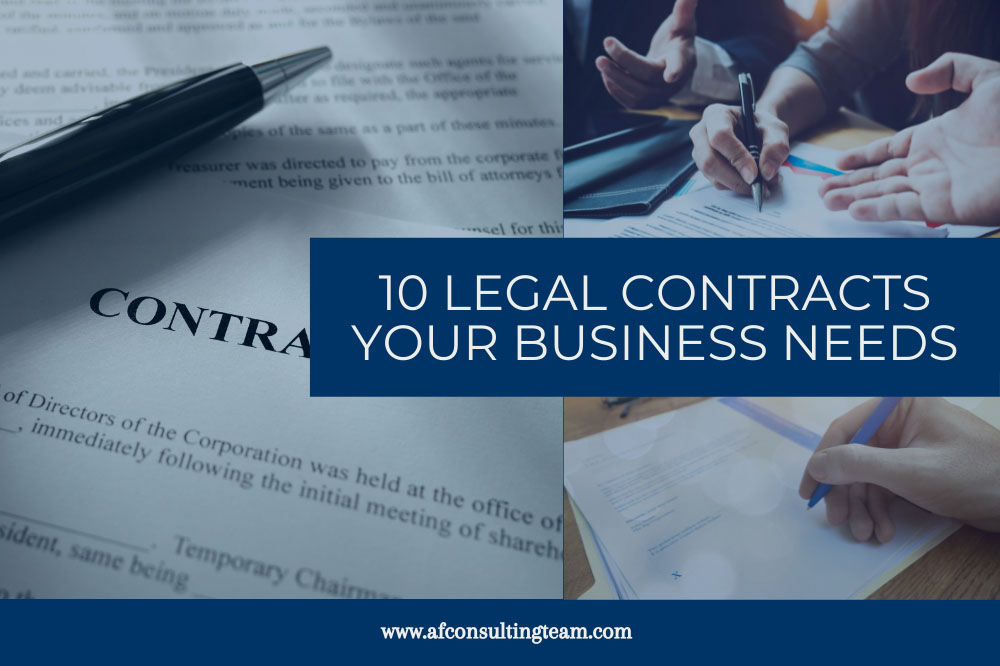When it comes to starting your business, no one really wants to think about the legal aspects (unless you’re a lawyer). Why? Because getting a lawyer usually means spending a lot of money, confusing legal jargon, and terrible, worst-case-scenario projections. Nothing about that sounds fun. But when it comes to protecting yourself and your business, there are a few legal forms that I consider to be absolutely essential, and although they don’t all apply to every business, every business should be aware of them:
- Operating Agreements: Whether your LLC consists of a single member or multiple members, you need a standard operating agreement. This will outline business financials, rules and regulations, and discuss how your internal operations will run, even in the event of death or a business sale.
- Partnership Agreements: If you are in a partnership, this document is absolutely vital! This explains who is required to do what within the business, how profits and losses will be divided, who owns the company and in what percentages, how conflicts will be managed, and so much more! Do not neglect this document!
- Nondisclosure Agreements: This protects the business and business owner from company information leaking out to the general public. It ensures there is legal recourse if a vendor, employee, contractor, etc. shares confidential company information. Always make sure to sign a Nondisclosure (NDA) when collaborating with others. I would also lump Confidentiality Agreements in here.
- Waiver of Liability: I am always shocked when I see a company ignore this type of contract, especially if the business involves physical activities (gyms and fitness studios, trampoline parks, event companies, etc). The purpose of this document is for clients to acknowledge and assume some of the risks of participating in your company’s activities. It’s also an excellent way to help you in the event of a lawsuit (though be advised it won’t protect you from every circumstance).
- Employment Contracts: If you are a small business, this might seem like an unnecessary step, but a general employment contract can explain job requirements, salary compensation, benefits like healthcare and vacation, job duration, and grounds for immediate termination. This document can help protect you in the event a disgruntled employee disputes a termination, but it can also protect the employee from unfair treatment.
- Independent Contractor Agreements: Not every business has employees, but many utilize the services of Independent Contractors. This document will help define the relationship between the business and the contractor and notate aspects of the job such as specific requirements, legal and insurance security, and liability and licensing requirements. Basically, you are making sure everyone understands the work to be performed, while also protecting the company from any legal issues that arise from the work or worker.
- Noncompete Agreements: Inevitably someone may leave your company. This contract prevents that employee or contractor from directly competing with you for a specified amount of time after leaving your company. Basically, this prevents them from stealing your clients.
- Privacy Policy: If you are in any way collecting information from your clients online (phone numbers, emails, etc.), then you need a privacy policy. This is especially important considering how much personal information is shared online, knowingly and unknowingly. This document outlines how your website or company will collect, store, protect, and use any personal information from your clients.
- Lease: If your business resides in a brick-and-mortar building that you do not own, then you need a lease, specifically a commercial lease agreement. A commercial lease covers more than just the rent owed—it includes details on maintenance and repairs, parking, security deposits, and so much more. Don’t be afraid to negotiate this agreement!
- Trademarks: There are a few different types of trademarks, and although they may not seem as essential as some of the above contracts, a trademark will help protect your brand name and your brand in a way that simply having an LLC cannot. You should always protect your intellectual property! I recommend filing on a Federal-level rather than a state level so you are covered nationwide.
Yes, there are more contracts out there–Asset Purchase Agreements, Indemnity Agreements, Franchise Agreements … even Petcare Agreements—but the above ten are the ones I encounter most, both in my own businesses, as well as for my clients.
And I know it’s scary and intimidating to consider all this information and how it applies to you, but I promise you it is worth the effort when it comes to protecting you and your business.
Do you have questions about a business contract? How can I help?

